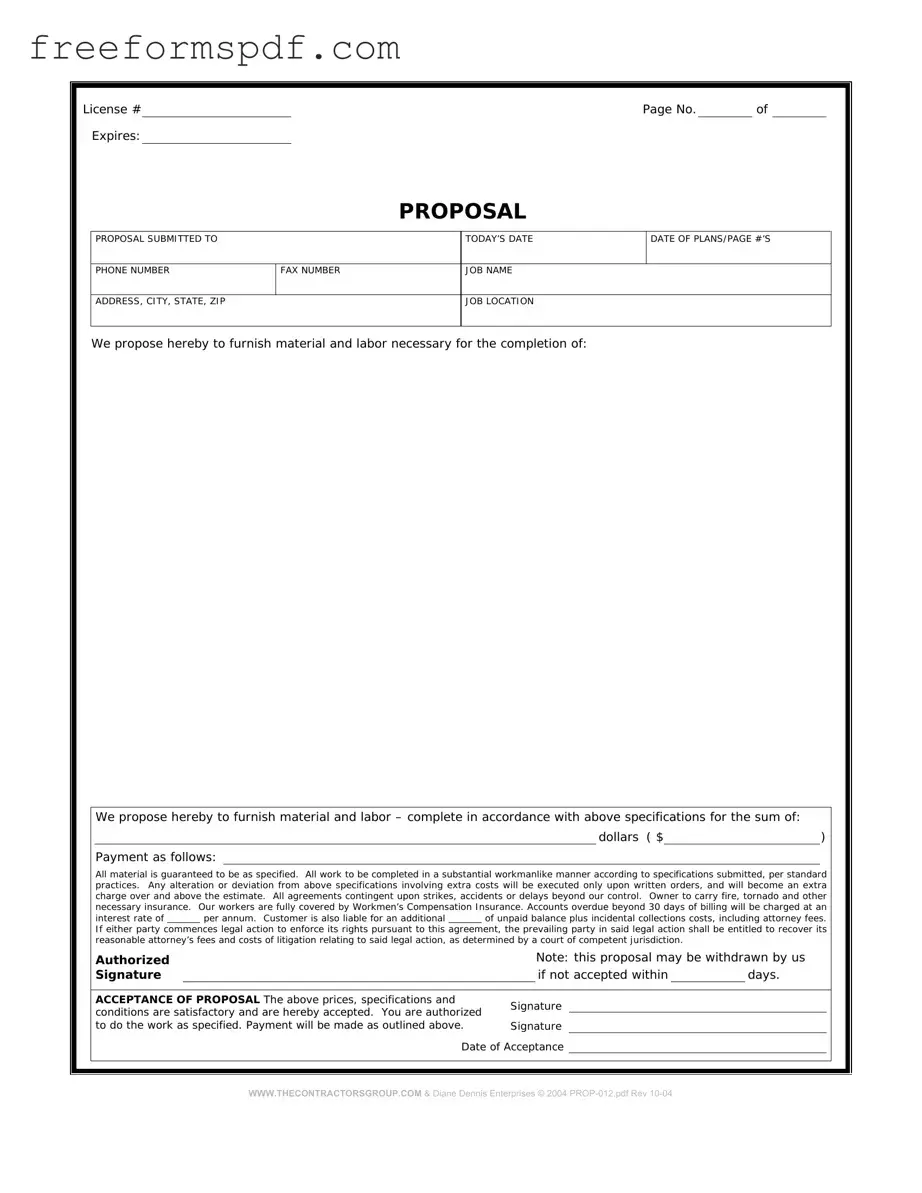Fill in a Valid Construction proposal form Template
Common mistakes
-
Incomplete Information: Many individuals fail to provide all necessary details. Missing contact information, project descriptions, or timelines can lead to confusion and delays.
-
Incorrect Pricing: Some people underestimate or overestimate costs. Providing accurate and realistic pricing is crucial to avoid disputes later on.
-
Omitting Terms and Conditions: Important terms regarding payment schedules, warranties, and project scope are sometimes left out. This omission can create misunderstandings.
-
Not Reviewing for Errors: Typos and grammatical errors can undermine professionalism. A thorough review can catch mistakes that might otherwise lead to complications.
-
Failure to Sign: Some individuals forget to sign the proposal. An unsigned document is not legally binding and will not be considered valid.
Learn More on This Form
-
What is a Construction Proposal Form?
A Construction Proposal Form is a document that outlines the details of a construction project. It typically includes information such as project scope, estimated costs, timelines, and terms of agreement. This form serves as a formal proposal from a contractor to a client, detailing what the contractor intends to deliver.
-
Why is it important to use a Construction Proposal Form?
Using a Construction Proposal Form is crucial for several reasons. First, it provides clarity on the project's scope and expectations, reducing the likelihood of misunderstandings. Second, it establishes a legal record of the proposed work, which can be referenced in case of disputes. Lastly, it helps clients compare different contractors based on their proposals, making the selection process easier.
-
What information should be included in the Construction Proposal Form?
A comprehensive Construction Proposal Form should include:
- Project description
- Scope of work
- Estimated costs and payment schedule
- Timeline for project completion
- Terms and conditions
- Contractor’s qualifications and experience
Including these details ensures that both parties have a clear understanding of the project and its requirements.
-
How can I ensure my Construction Proposal Form is effective?
To make your Construction Proposal Form effective, be clear and concise. Use straightforward language to explain the project scope and costs. Be specific about timelines and deliverables. It's also beneficial to include any relevant certifications or past project examples to build credibility. Finally, ensure that all parties involved review the proposal thoroughly before signing.
-
Can a Construction Proposal Form be modified after submission?
Yes, a Construction Proposal Form can be modified after submission, but both parties must agree to the changes. It's important to document any modifications in writing and have both parties sign off on the updated proposal. This ensures that all parties are on the same page and helps prevent future disputes.
Misconceptions
Many people have misunderstandings about the construction proposal form. Here are seven common misconceptions explained clearly.
-
It's just a formality.
Some believe that the proposal form is a mere formality. In reality, it is a crucial document that outlines the project scope, costs, and timelines. It serves as a foundation for the entire project.
-
Only contractors need to fill it out.
While contractors often complete the form, clients must also provide input. Their requirements and expectations are essential for creating an accurate proposal.
-
All proposals look the same.
Not all proposals are identical. Each one is tailored to the specific project and the needs of the client. Variations in design and content reflect the unique aspects of each job.
-
Once submitted, it can't be changed.
Many think that a submitted proposal is set in stone. However, proposals can be revised. If project details change, adjustments can be made before final agreements are signed.
-
It's only about cost.
While pricing is a significant factor, the proposal also includes timelines, materials, and labor. A comprehensive proposal gives a complete picture of the project.
-
It's not legally binding.
Some assume that a proposal is just an estimate. In fact, once accepted, it can become a legally binding contract. Understanding this is key for both parties.
-
You don’t need to review it.
Many people overlook the importance of reviewing the proposal. Thoroughly checking the details can prevent misunderstandings and ensure everyone is on the same page.
Browse More Forms
Florida Family Law Financial Affidavit Short Form - Failure to accurately complete the form can lead to legal complications.
This essential document, often referred to as the Arizona Motorcycle Bill of Sale, plays a vital role in the secure transaction process for motorcycle sales. It ensures both the buyer and seller are protected and fully informed, facilitating a straightforward exchange of ownership.
What Does a Job Application Look Like - Share any special skills or training that could benefit your application.
Statement of Facts California Dmv - The form also addresses conditions that may affect driving abilities.
